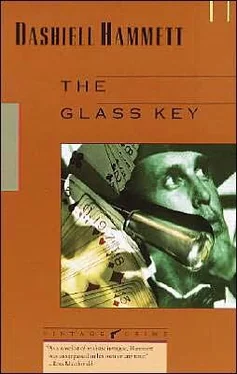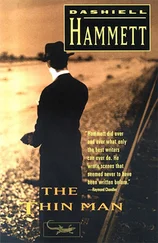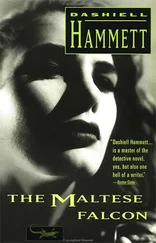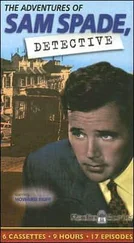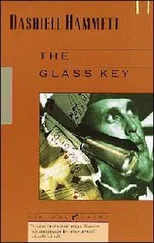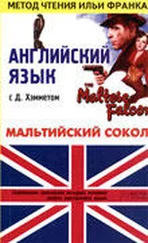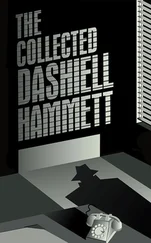He laughed and asked in a mocking tone: "Hadn't I known that all along?"
Her expression was not affected by his humor. "Why did you ask if I had seen the Observer?" she demanded. "What was in it?"
"Some more of the same sort of nonsense," he told her evenly. "It's. there on the table if you want to see it. There'll be plenty of it before the campaign's over: this is going to be that kind. And you'll be giving your father a swell break by swallowing—" He broke off with an impatient gesture because she was no longer listening to him.
She had gone to the table and was picking up the newspaper he had put down when she came in.
He smiled pleasantly at her back and said: "It's on the front page, An Open Letter to the Mayor."
As she read she began to tremble—her knees, her hands, her mouth— so that Ned Beaumont frowned anxiously at her, but when she had finished and had dropped the newspaper on the table and had turned to face him directly her tall body and fair face were statue-like in their immobility. She addressed him in a low voice between lips that barely moved to let the words out: "They wouldn't dare say such things if they were not true."
"That's nothing to what'll be said before they're through," he drawled lazily. He seemed amused, though there was a suggestion of anger difficultly restrained in the glitter of his eyes.
She looked at him for a long moment, then, saying nothing, turned. towards the door.
He said: "Wait."
She halted and confronted him again. His smile was friendly now, ingratiating. Her face was a tinted statue's.
He said: "Politics is a tough game, snip, the way it's being played here this time. The Observer is on the other side of the fence and they're not worrying much about the truth of anything that'll hurt Paul. They—"
"I don't believe that," she said. "I know Mr. Mathews—his wife was only a few years ahead of me at school and we were friends—and I don't believe he'd say anything like that about Dad unless it was true, or unless he had good reason for thinking it true."
Ned Beaumont chuckled. "You know a lot about it. Mathews is up to his ears in debt. The State Central Trust Company holds both mortgages on his plant—one on his house too, for that matter. The State Central belongs to Bill Roan. Bill Roan is running for the Senate against Henry. Mathews does what he's told to do, and prints what he's told to print."
Opal Madvig did not say anything. There was nothing to indicate that she had been at all convinced by Ned Beaumont's argument.
He went on, speaking in an amiable, persuasive tone: "This"—he flicked a finger at the paper on the table—"is nothing to what'll come later. They're going to rattle Taylor Henry's bones till they think up something worse and we're going to have this sort of stuff to read till election's over. We might just as well get used to it now and you, of all people, oughtn't to let yourself be bothered by it. Paul doesn't mind it much. He's a politician and—"
"He's a murderer," she said in a low distinct voice.
"And his daughter's a chump," he exclaimed irritably. "Will you stop that foolishness?"
"My father is a murderer," she said.
"You're crazy. Listen to me, snip. Your father had absolutely nothing to do with Taylor's murder. He—"
"I don't believe you," she said gravely. "I'll never believe you again."
He scowled at her.
She turned and went to the door.
"Wait," he said. "Let me—"
She went out and shut the door behind her.
7
Ned Beaumont's face, after a grimace of rage at the closed door, became heavily thoughtful. Lines came into his forehead. His dark eyes grew narrow and introspective. His lips puckered up under his mustache. Presently he put a finger to his mouth and bit its nail. He breathed regularly, but with more depth than usual.
Footsteps sounded outside his door. He dropped his appearance of thoughtfulness and walked idly towards the window, humming Little Lost Lady. The footsteps went on past his door. He stopped humming and bent to pick up the sheet of paper holding the three questions that had been addressed to Opal Madvig. He did not smooth the paper, but thrust it, crumpled in a loose ball as it was, into one of his bathrobe-pockets.
He found and lit a cigar then and, with it between his teeth burning, stood by the table and squinted down through smoke at the front page of the Observer lying there.
AN OPEN LETTER TO THE MAYOR
SIR:
The Observer has come into possession of certain information which it believes to be of paramount importance in clearing up the mystery surrounding the recent murder of Taylor Henry.
This information is incorporated in several affidavits now in the Observer's safety-deposit box. The substance of these affidavits is as follows:
1.That Paul Madvig quarreled with Taylor Henry some months ago over the young man's attentions to his daughter and forbade his daughter to see Henry again.
2.That Paul Madvig's daughter nevertheless continued to meet Taylor Henry in a furnished room he had rented for that purpose.
3.That they were together in this furnished room the afternoon of the very day on which he was killed.
4.That Paul Madvig went to Taylor Henry's home that evening, supposedly to remonstrate with the young man, or his father, again.
5.That Paul Madvig appeared angry when he left the Henry residence a few minutes before Taylor Henry was murdered.
6.That Paul Madvig and Taylor Henry were seen within half a block of each other, less than a block from the spot where the young man's body was found, not more than fifteen minutes before his body was found.
7.That the Police Department has not at present a single detective engaged in trying to find Taylor Henry's murderer.
The Observer believes that you should know these things and that the voters and taxpayers should know them. The Observer has no ax to grind, no motive except the desire to see justice done. The Observer will welcome an opportunity to hand these affidavits, as well as all other information it has, to you or to any qualified city or state official and, if such a course can be shown an aid to justice, to refrain from publishing any or all of the details of these affidavits.
But the Observer will not permit the information incorporated in these affidavits to be ignored. If the officials elected and appointed to enforce law and order in this city and state do not consider these affidavits of sufficient importance to be acted upon, the Observer will carry the matter to that higher tribunal, the People of this City, by publishing them in full.
H. K. MATHEWS, Publisher
Ned Beaumont grunted derisively and blew cigar-smoke down at this declaration, but his eyes remained somber.
8
Early that afternoon Paul Madvig's mother came to see Ned Beaumont. He put his arms around her and kissed her on both cheeks until she pushed him away with a mock-severe "Do stop it. You're worse than the Airedale Paul used to have."
"I'm part Airedale," he said, "on my father's side," and went behind her to help her out of her sealskin coat.
Smoothing her black dress, she went to the bed and sat on it.
He hung the coat on the back of a chair and stood—legs apart, hands in bathrobe-pockets—before her.
She studied him critically. "You don't look so bad," she said presently, "nor yet so good. How do you feel?"
"Swell. I'm only hanging around here on account of the nurses."
"That wouldn't surprise me much, neither," she told him. "But don't stand there ogling me like a Cheshire cat. You make me nervous. Sit down." She patted the bed beside her.
He sat down beside her.
She said: "Paul seems to think you did something very grand and noble by doing whatever it was you did, but you can't tell me that if you had behaved yourself you would ever have got into whatever scrape you got into at all."
Читать дальше
